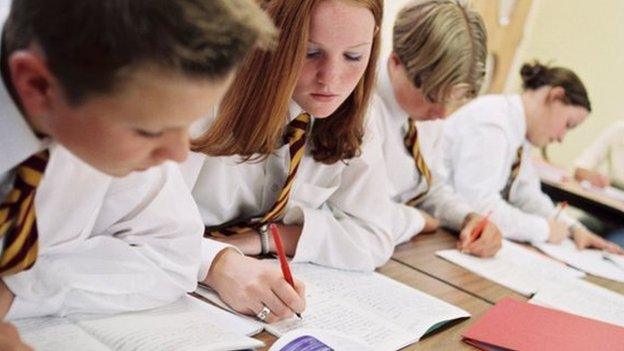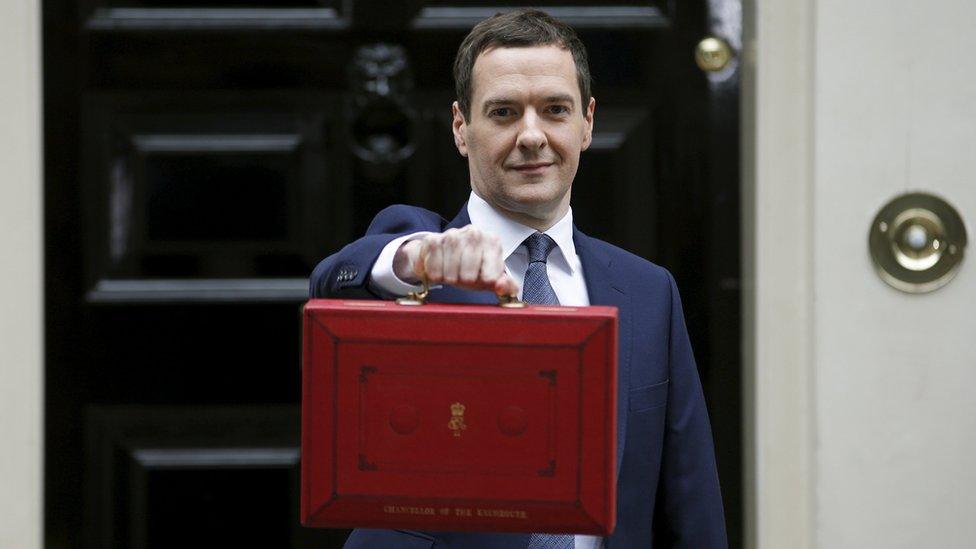Budget 2016 'black hole' in academy plan, claims Labour
- Published

Labour has warned more academisation could leave schools out of pocket
Labour says it has identified a £560m "black hole" in the government's plan to force all schools in England to become academies.
The plan was outlined in the Budget on Wednesday, with details, external set out on Thursday.
Labour's shadow education secretary Lucy Powell said ministers' failure to fully fund the plan would leave schools "further out of pocket".
The Conservatives said Labour's calculations were "way off the mark".
Labour calculations
Labour calculates the cost of conversion per school comes to £44,837 - made up of a £25,000 grant paid to schools to cover the expense of conversion for things like legal and human resources, software licensing and rebranding.
On top of this, local authorities also incur legal costs and they are also liable for schools' budget deficits when they convert to academy status.
These costs to councils average £12,300 and £7,537 per school according to Labour's analysis of official figures, giving a full cost of converting all these schools of £700m.
With 15,632 schools still to convert, the overall cost is around £700m, says Labour.
The Budget allocates £640m over four years to be split between meeting the cost of full academisation and the funding of a new formula to end uneven levels of funding for schools in England.
But Labour highlights another section of the same document which earmarks £500m for the new national funding formula.
If this comes out of the £640m that would leave just £140m for academisation, says Labour.
But the Conservatives called the calculations "shoddy" as some of the £500m would come from money already allocated in the Autumn Spending Review as well as from the Budget - but they could not say how much.
"These back of the fag packet estimates are way off the mark. They neglect the significant funding earmarked for academisation at the spending review and make totally inaccurate assumptions about the cost of converting schools to academy status.
"The Chancellor's Budget ensured that the department is fully funded to support the additional costs of delivering a fully-academised school system," said the spokesman.
'Optimistic'
The Institute for Fiscal Studies said it was clear converting all schools to academies would entail additional costs.
"The government will, however, have already been expecting a certain number of schools to become academies within this parliament and will have been planning to meet this from within its existing budget," said Luke Sibieta, IFS programme director for education.
"It would therefore be hard to put a precise figure on the additional cost of yesterday's commitment to increase the pace of conversion and extend it to all schools.
"In any case, the government could seek to lower the costs of conversion, particularly if converting thousands of schools en masse ends up being cheaper. Savings will also be made in scaling back the role of local authorities."

The ASCL said more accurate forecasting was needed on the financial impact of forced academisation
Malcolm Trobe, interim general secretary of the Association of School and College Leaders, said Labour were correct in identifying the costs incurred by councils but warned the figures were estimates.
"There are significant variations, particularly in the nature of land transfers and it gets particularly complicated when church schools are involved.
"The government needs to provide sufficient funding to ensure there's a smooth transition to academy status.
"There needs to be more accurate forecasting in order to work out the impacts," said Mr Trobe.
The Local Government Association did not comment directly on Labour's estimates but Roy Perry, chairman of its Children and Young People Board, said councils had "been forced to spend millions of pounds to cover the cost of schools becoming academies in recent years".
"With mixed evidence about academisation improving standards, and when public spending is facing significant cuts, imposing academisation on schools regardless of local opinion cannot be an appropriate use of public money," said Mr Perry.
- Published16 March 2016

- Published15 March 2016